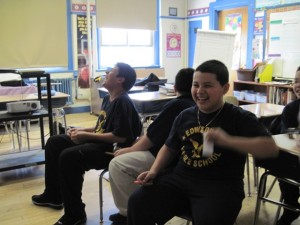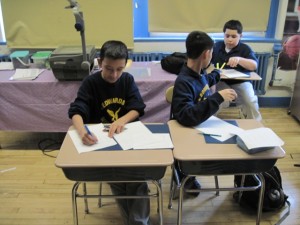Finding Balance in the Classroom
Greg Beach is a First Year Teaching Fellow at the Edwards Middle School in Charlestown, MA
 As I’m sure was the case for many Teaching Fellows, I joined the Citizen Schools ranks unsure of what to expect. I was drawn to this program by what I believe to be its strongest component, the apprenticeship. The community-building, hands-on learning experience of the apprenticeship was inspiring to me. More to the point, it was an aspect of my first post-graduation job that was easily explained to others.
As I’m sure was the case for many Teaching Fellows, I joined the Citizen Schools ranks unsure of what to expect. I was drawn to this program by what I believe to be its strongest component, the apprenticeship. The community-building, hands-on learning experience of the apprenticeship was inspiring to me. More to the point, it was an aspect of my first post-graduation job that was easily explained to others.
I quickly learned how different each region and each campus within regions could be from each other, not just in campus culture but in the very structure of program. From my campus interview as a prospective Teaching Fellow, I got the impression that my new position would be a mix of afterschool counselor and tutor. Thus, I was caught off-guard when I discovered that I would be teaching a 50 minute math lesson every day. I had not taken a math course since freshman year of college and yet here I was, explaining how to multiply fractions to 6th graders.
 Although it was an adjustment, this unexpected role empowered me with strength and perspective on my teaching going forward. I’ve found that some of my personal expectations do not align perfectly with what I have experienced in the trenches of teaching. That being said, finding a balance between one’s own values and style and the practical demands of reality is essential to becoming a successful Teaching Fellow.
Although it was an adjustment, this unexpected role empowered me with strength and perspective on my teaching going forward. I’ve found that some of my personal expectations do not align perfectly with what I have experienced in the trenches of teaching. That being said, finding a balance between one’s own values and style and the practical demands of reality is essential to becoming a successful Teaching Fellow.
I am still learning and experimenting with how to best teach math. Some lessons are successful, others are disappointing and discouraging. However, this up and down of trying new things and refining those that work well energizes and encourages me for the next day. Success or failure, every lesson is one step towards being an excellent educator.
While I am trying to improve my math instruction, I am also struggling to find a balance between my values and the reality of working in an urban public school. I believe that the purpose of education is to liberate the individual and encourage the formation of free communities. This is reflected in my discussion-centered approach to resolving conflicts and my hesitance to send students out of the room.
 Despite the general success of my teaching style, sometimes 6th graders act like 6th graders. Although most of my students appreciate what I am trying to do, some are still not capable of this and choose to take advantage of the situation. Despite my desire to talk it out, they need to contend with real consequences for their poor choices. As I have done with my math instruction, I need to find the parts of my teaching style that have worked, refine and promote them while altering the aspects that lack focus and produce undesired results. One idea could involve having incentivized “free choice” times in which students can play games and talk with each other if they have met my expectations during a lesson. There are many different ways to incorporate free space into a disciplined classroom and I am excited to work towards this balance.
Despite the general success of my teaching style, sometimes 6th graders act like 6th graders. Although most of my students appreciate what I am trying to do, some are still not capable of this and choose to take advantage of the situation. Despite my desire to talk it out, they need to contend with real consequences for their poor choices. As I have done with my math instruction, I need to find the parts of my teaching style that have worked, refine and promote them while altering the aspects that lack focus and produce undesired results. One idea could involve having incentivized “free choice” times in which students can play games and talk with each other if they have met my expectations during a lesson. There are many different ways to incorporate free space into a disciplined classroom and I am excited to work towards this balance.
Balance is something that every teacher needs in order to succeed. Finding this balance can be a challenge for novice teachers but working towards a balanced teaching style is rewarding, both for the learning process and in the result.
Do you have any suggestions for beginning teachers looking to find balance in their classrooms and lives?
